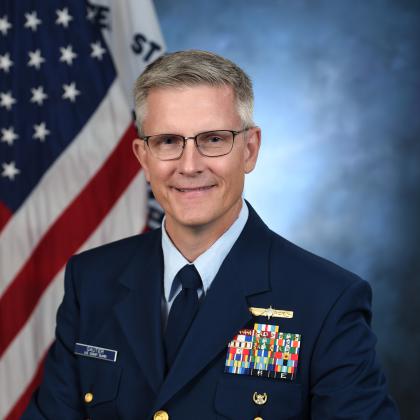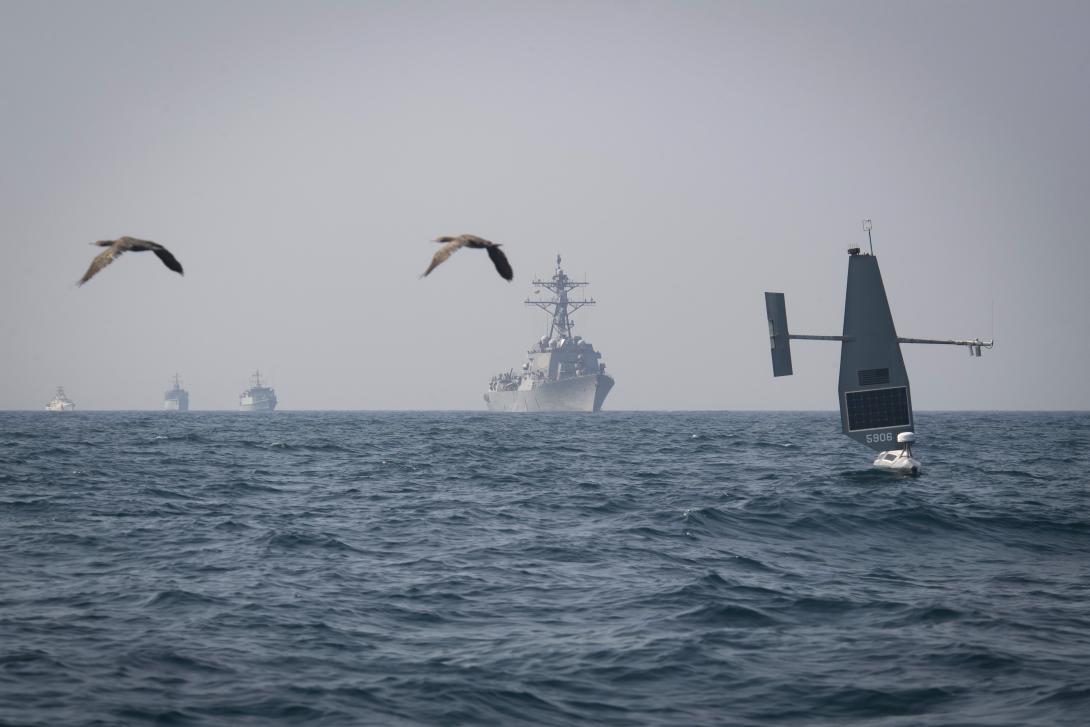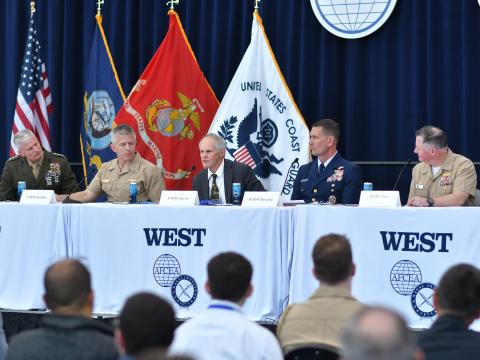Russia and China Drive Demand for Coast Guard Partnerships
The U.S. Coast Guard is seeing a significant increase in requests for international partnerships in the maritime domain due in part to Chinese and Russian aggression across the globe.
The Coast Guard pulls double duty as both a military service and law enforcement organization and conducts a variety of missions, including maritime security, search and rescue, drug interdiction, counter-piracy and commercial fishing law enforcement. Now, with China aggressively exerting influence around the world, Russia invading Ukraine and both seeking strategic advantage in the Arctic, the Coast Guard is witnessing unusually high levels of international engagement, according to Vice Adm. Peter Gautier, Coast Guard deputy commandant for operations.
“Quite frankly, that’s driven by the geostrategic threats that we face urgently from Russia in the war with Ukraine but also the pacing threat of China that drives a lot of interest from the international community to the U.S. Coast Guard in order to get our assistance for them to be able to govern their own maritime spaces,” Adm. Gautier said.
The Coast Guard finds itself in a moment in which both U.S. government agencies and international organizations recognize and appreciate its multimission expertise and the authorities it carries, Adm. Gautier reported. “That manifests itself not just in Coast Guard operations around the globe, but also in international partners wanting to participate with us more, wanting deeper relationships with us. That manifests itself in everything from joint operations to bilateral agreements to training opportunities.”
He added that new interest comes from traditional allies, Pacific Island nations, Western African countries and others. In fact, a recently signed bilateral agreement with the Federated States of Micronesia (FSM) allows the Coast Guard to help police vast regions of the western Pacific. “Usually, we do that with a ship rider from their country. Now, we don’t have to have a ship rider from the FSM on board. We can let them know that we’ve encountered, say, a Chinese fishing vessel in their waters, and we ask their permission to do a boarding, and they’ll grant that. We’ll do a boarding and enforce their rules through the U.S. Coast Guard,” Adm. Gautier explained. “We have a cutter there now conducting those boardings.”
Last fall, the Coast Guard hosted every prime minister of every Pacific Island nation at its headquarters to “recognize the importance of the Oceania nations to our security and international security,” the admiral pointed out. The event was sponsored by the White House National Security Council, facilitated by the State Department, and attended by the secretary of the interior and the secretary of the Navy, the admiral said.
He asserted that interest in working with the Coast Guard is the highest he has seen in his 35-year career for a number of reasons, including malicious adversaries challenging the rules and norms that have mostly ensured peace and security since World War II. “We find ourselves in a moment in history where those very rules and norms are being challenged in a major way by China and other malicious actors in physical space, in cyberspace and in space,” he said. “The U.S. Coast Guard continues to be looked at by the White House, by Congress, by our U.S. partners, by our international partners, as a unique agency, as a unique military service that does law enforcement, that’s humanitarian, that’s military, that regulates the safety and security of our waterways, as being the answer to many of our global problems.”
He specifically cited climate change, which sparks increased competition in the Arctic region. As glaciers melt, waterways open up, making the region strategically valuable for multiple nations.
Last summer, the Coast Guard encountered a combined surface action group made up of Russian and Chinese naval forces in the U.S. Exclusive Economic Zone in the Aleutian Islands. “We had a Coast Guard cutter and a Coast Guard C130 that met their presence with our presence to make sure they knew we were there to police that activity and ensure they were in compliance with international law. We see that with increasing frequency. We encountered a Russian surface action group the year before,” he recalled.

It is a great example of a whole-of-U.S. government and, I might say, whole-of-international-government effort.
Illegal, unreported and unregulated (IUU) fishing also is a major factor that fosters the need for international cooperation. In addition to aggressively fishing areas from its own shores, China’s fishing boats allegedly serve a dual purpose—commercial fishing and military support. The so-called maritime militia drew attention in 2021, for example, when 200 boats deployed to the Whitsun Reef inside the exclusive economic fishing zone owned by the Philippines.
“China operates the largest distant-water fishing fleet in the world. That fleet number is subsidized by China, and it goes well beyond what the market forces can produce. The maritime militia’s a quasi-governmental fleet of fishing vessels that can act in concert with their navy and their coast guard to advance what China thinks its own interests are,” Adm. Gautier explained.
In September 2020, the Coast Guard published a new strategy for combating IUU fishing. “IUU fishing has replaced piracy as the leading global maritime security threat. If IUU fishing continues unchecked, we can expect deterioration of fragile coastal states and increased tension among foreign-fishing nations, threatening geo-political stability around the world,” the strategy states. “The U.S Coast Guard is prepared to take an enhanced leadership role in this effort, but we will not be successful alone. Playing to our strengths of working with intergovernmental and international partners, we seek to galvanize a coalition to confront coercive and antagonistic activity together and uphold our shared peaceful and humanitarian values.”
That strategy, according to Adm. Gautier, has generated interest across the U.S. government and around the world in partnering with the Coast Guard, which has been in the fisheries enforcement business for a century or more. The strategy “generated incredible interest” from the Defense Department—U.S. Southern Command in particular—but also U.S. Indo-Pacific Command, U.S. Africa Command and U.S. European Command, and has since gone global.
“We’ve got relationships across the globe already. We’ve got relationships Coast Guard to coast guard, Coast Guard to foreign navy, Coast Guard to foreign transportation departments. We’ve got relationships with the international countries through combatant commanders. As well, I think we take a whole-of-government approach,” Adm. Gautier said. “It is a great example of a whole-of-U.S. government and, I might say, whole-of-international-government effort.”




Comments